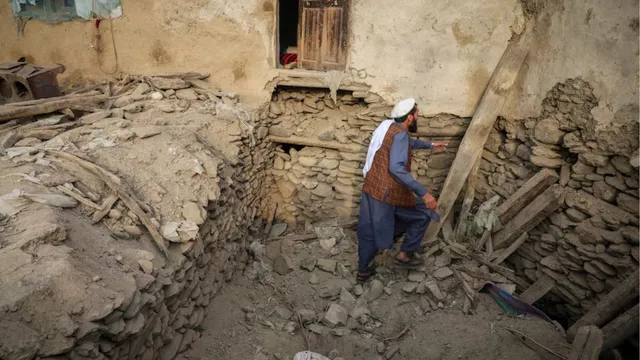- By Supratik Das
- Fri, 05 Sep 2025 07:42 AM (IST)
- Source:JND
Afghanistan earthquake news: Afghanistan continues to reel under a relentless wave of earthquakes that have struck the country since Sunday, leaving thousands dead, injured, and tens of thousands displaced. A series of successive tremors from 4.1 to 6.2 magnitudes hit huge areas of Kunar and Nangarhar provinces, with aid organisations warning that the crisis could worsen as aftershocks continue and resources dwindle.
On Friday morning, a magnitude 5.4 earthquake struck southeastern Afghanistan at a shallow depth of 10 kilometres, according to the German Research Centre for Geosciences (GFZ). Around the same time, the National Centre for Seismology (NCS) reported another quake of magnitude 4.9 in the early hours of the day, with its epicentre located at a depth of 120 kilometres. These tremors followed two back-to-back earthquakes on Thursday night, measuring 5.8 and 4.1, which shook the same region within a span of just two hours. The repeated seismic shocks have raised alarm over the stability of already weakened structures, forcing survivors to remain out in the open despite deteriorating weather conditions.
A magnitude 5.4 earthquake struck southeastern Afghanistan on Friday, the German Research Center for Geosciences (GFZ) said. https://t.co/Zgadqe1KT9 https://t.co/Zgadqe1KT9
— Reuters Science News (@ReutersScience) September 5, 2025
Death Toll Rises Amid Destruction Of Homes
The Taliban government confirmed that at least 2,205 individuals were killed and over 3,600 wounded since the initial strong earthquake of magnitude 6 hit on Sunday. Entire villages have been destroyed, with the United Nations estimating that over 6,700 houses were totally destroyed. Aid agencies report that in parts of Kunar province, as many as 98 per cent of houses have collapsed or been heavily damaged, with families having no shelter to turn to. Local residents, most of whom have lost families, keep trying to dig through debris to search for survivors. “Everything we had has been destroyed. The only remaining things are these clothes on our backs,” said Aalem Jan, a resident of Kunar province whose house was flattened in the quake.
The World Food Programme (WFP) has provided swift relief to earthquake-affected areas, distributing food items and high-energy biscuits to affected families. WFP regional director Harald Mannhardt spoke of the devastation, stating: "Houses in ruins, roads blocked, landslides on all sides, and sadly, lives lost." Still, he cautioned that relief efforts remain severely restricted by impassable roads, mountainous terrain, and continued aftershocks.
India and International Community Step Up Relief Assistance
India has reaffirmed solidarity by sending 21 tonnes of earthquake relief items to Kabul. External Affairs Minister S. Jaishankar asserted on X that the shipment consisted of blankets, tents, medicines, hygiene kits, water storage tanks, kitchenware, portable purifiers, sleeping bags, wheelchairs, and emergency consumables. The United Nations and various aid organizations have also called on the international community to increase contributions. The World Health Organisation (WHO) has indicated a serious funding shortage of close to USD 3 million to achieve an uninterrupted supply of trauma kits, drugs, and other critical commodities. The WFP has warned that its current funding in Afghanistan is adequate for just four more weeks unless new funds are allocated.
The recent earthquakes are among the deadliest natural disasters Afghanistan has witnessed in years, compounding an already fragile humanitarian situation caused by war, poverty, and shrinking foreign aid. Afghanistan is especially vulnerable to the earthquakes because it lies along the Hindu Kush mountain range, where the Indian and Eurasian tectonic plates overlap, and where houses were built poorly with mud, stone, and wood. As winter approaches, people without shelter are preparing for worse. Aid workers emphasise that the crisis is not just about immediate relief but about rebuilding lives and communities. "The earthquake must be a wake-up call: Afghanistan cannot be left to tackle one crisis after another by itself," said Jacopo Caridi of the Norwegian Refugee Council.

